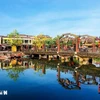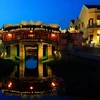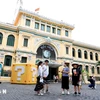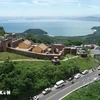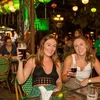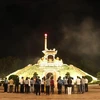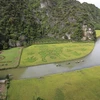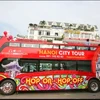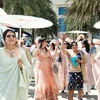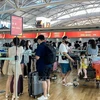The Vietnam Military History Museum in Hanoi has so far received more than 17 million visitors, half of them foreigners from more than 150 countries. Report by the Voice of Vietnam Radio.
Located in the centre of Hanoi, the Vietnam Military History Museum is one of the seven national museums with the greatest number of objects and visitors. With its unique objects and materials, the museum has become a cultural and historical centre and a popular destination for tourists.
Visiting the Museum, the Guy Bagot couple from Australia spent a lot of time by the portrait of General Vo Nguyen Giap in the exhibition room “Vo Nguyen Giap - First General and Commander-in-Chief”. The husband took part in the American war in Vietnam from 1968 to 1970. At that time, Bago said he knew nothing about the strength of the Vietnamese army but soldiers like him always mentioned the General with respect.
The Vietnam Military History Museum, previously the Army Museum, was founded in 1956 and opened to public three years later. In 1964, it was named the Vietnam Army Museum Academy and in 2002, it became the Vietnam Military History Museum.
Of the museum’s 150,000 objects and documents, about 2,000 are on display in an area of about 3,200 square meters. The exhibits reflect the lively history of Vietnam’s national founding and construction from the Hung Kings to the Ho Chi Minh era through replications of some prominent battles against foreign invaders. They demonstrate the Vietnamese army’s strategies and art of war.
Colonel Nguyen Xuan Nang, Director of the Museum, says that the museum is divided into six parts featuring six different themes: heroic Vietnamese mothers, heroic Vietnamese nation, heroic Vietnamese people’s army, the tradition of the Vietnam People’s Army, Vietnamese weapons and weapon production tools, the world’s support for Vietnam’s resistance wars and relations between the Vietnam People’s Army and those in other countries.
Nang says: “The museum attracts visitors because it is located in a historical relic site - the Hanoi Flag Tower, which is closely associated with the capital. This is the only museum in Vietnam that has an outdoor display of large objects, weapons and war remnants of both Vietnam and its rivals. Foreign visitors are interested in major historical events including the Dien Bien Phu Campaign and the Ho Chi Minh Campaign. The museum keeps two sand-tables of these two campaigns and offers introduction and presentations in six languages”.
Over the past 50 years, the museum has always paid attention to improving its displays and information. It has renovated the exhibit system, improving it in terms of scale, content and formats. Over the last decade, the museum has published 30 books and organised 70 exhibitions. Each year, the museum’s researchers collect about 600 objects. In particular, following the movement to collect and display war remnants that was active between 2009 and 2010, the museum received more than 10,000 objects from war veterans and visitors.
Colonel Nang says: “The museum is now displaying two of the 30 recognised national precious objects. They are the MIG 21 plane coded 5121, which Hero Pilot Pham Tuan used during the Dien Bien Phu in the air campaign to shoot down a US B52 bomber, and a tank coded 843 which was the first to enter Independence Palace on April 30, 1975. In particular, the exhibition featuring the self-made weapons of the Vietnamese army attracts a lot of visitors, especially foreigners. Only after visiting the museum can they really understand how Vietnam, a small and poor country without modern weapons, defeated both the French and Americans”.
The museum has received more than 17 million visitors, half of them foreigners from more than 150 countries. Nguyen Thi Lan Huong working in the Display- Communication Section of the Museum says: “There have been many foreigners visiting the museum but I’m most impressed with those from South Africa. When they were introduced to the exhibition on the Dien Bien Phu Campaign, they said that the South African people were very impressed by this victory, which has encouraged South Africans in particular and African people in general to rise up to wrest back independence”.
The museum is submitting to the Ministry of National Defense a plan to upgrade and modernise the museum to introduce more exhibits to meet increasing visitor demand. Once upgraded, the new museum will bring to visitors a more panoramic view of Vietnam, its land and people, and the strength of the Vietnam People’s Army.-VNA
Located in the centre of Hanoi, the Vietnam Military History Museum is one of the seven national museums with the greatest number of objects and visitors. With its unique objects and materials, the museum has become a cultural and historical centre and a popular destination for tourists.
Visiting the Museum, the Guy Bagot couple from Australia spent a lot of time by the portrait of General Vo Nguyen Giap in the exhibition room “Vo Nguyen Giap - First General and Commander-in-Chief”. The husband took part in the American war in Vietnam from 1968 to 1970. At that time, Bago said he knew nothing about the strength of the Vietnamese army but soldiers like him always mentioned the General with respect.
The Vietnam Military History Museum, previously the Army Museum, was founded in 1956 and opened to public three years later. In 1964, it was named the Vietnam Army Museum Academy and in 2002, it became the Vietnam Military History Museum.
Of the museum’s 150,000 objects and documents, about 2,000 are on display in an area of about 3,200 square meters. The exhibits reflect the lively history of Vietnam’s national founding and construction from the Hung Kings to the Ho Chi Minh era through replications of some prominent battles against foreign invaders. They demonstrate the Vietnamese army’s strategies and art of war.
Colonel Nguyen Xuan Nang, Director of the Museum, says that the museum is divided into six parts featuring six different themes: heroic Vietnamese mothers, heroic Vietnamese nation, heroic Vietnamese people’s army, the tradition of the Vietnam People’s Army, Vietnamese weapons and weapon production tools, the world’s support for Vietnam’s resistance wars and relations between the Vietnam People’s Army and those in other countries.
Nang says: “The museum attracts visitors because it is located in a historical relic site - the Hanoi Flag Tower, which is closely associated with the capital. This is the only museum in Vietnam that has an outdoor display of large objects, weapons and war remnants of both Vietnam and its rivals. Foreign visitors are interested in major historical events including the Dien Bien Phu Campaign and the Ho Chi Minh Campaign. The museum keeps two sand-tables of these two campaigns and offers introduction and presentations in six languages”.
Over the past 50 years, the museum has always paid attention to improving its displays and information. It has renovated the exhibit system, improving it in terms of scale, content and formats. Over the last decade, the museum has published 30 books and organised 70 exhibitions. Each year, the museum’s researchers collect about 600 objects. In particular, following the movement to collect and display war remnants that was active between 2009 and 2010, the museum received more than 10,000 objects from war veterans and visitors.
Colonel Nang says: “The museum is now displaying two of the 30 recognised national precious objects. They are the MIG 21 plane coded 5121, which Hero Pilot Pham Tuan used during the Dien Bien Phu in the air campaign to shoot down a US B52 bomber, and a tank coded 843 which was the first to enter Independence Palace on April 30, 1975. In particular, the exhibition featuring the self-made weapons of the Vietnamese army attracts a lot of visitors, especially foreigners. Only after visiting the museum can they really understand how Vietnam, a small and poor country without modern weapons, defeated both the French and Americans”.
The museum has received more than 17 million visitors, half of them foreigners from more than 150 countries. Nguyen Thi Lan Huong working in the Display- Communication Section of the Museum says: “There have been many foreigners visiting the museum but I’m most impressed with those from South Africa. When they were introduced to the exhibition on the Dien Bien Phu Campaign, they said that the South African people were very impressed by this victory, which has encouraged South Africans in particular and African people in general to rise up to wrest back independence”.
The museum is submitting to the Ministry of National Defense a plan to upgrade and modernise the museum to introduce more exhibits to meet increasing visitor demand. Once upgraded, the new museum will bring to visitors a more panoramic view of Vietnam, its land and people, and the strength of the Vietnam People’s Army.-VNA




